Plants are critically important for aquariums since they can provide hiding places for your fish, on the other hand, they can also improve the dissolved oxygen levels. Nonetheless, the outgrowth of plants is bad for your tanks. Thus, regular pruning or removal is needed. In this article, we will share with you about duckweed. Without further ado, let’s dive into the article.
Content Table
What is Duckweed?
Duckweed is one kind of aquatic flowering plant, which is a small floating aquarium plant. It comes from North America, Asia, Africa, and Europe. It is found in still waters and grows closely, just like a green carpet. Duckweed consists of three small leaves, possessing the appearance of a three-leaf arrangement. The leaves are always 0.12 inches in length. Besides, it has a small white root, less than one or two inches in length in general. For its excellent adaptability, it is hardy and can survive in cold or tropical water.
Next, here is more specific information about duckweed:
| Size | 0.25-0.5 inches |
| Temperature | 63-79℉ |
| Accepted pH Level | 6.0-8.0 |
| Color of Flower | green |
| Bloom Time | summer |
| Lighting Level | low-high |
| Lighting Time | 6–10 hours |
| Care Level | easy |
| Minimum Tank Size | 2 gallons |
Is Duckweed Invasive?
Duckweed is potentially invasive. It can grow or reproduce rapidly. With ideal conditions, it even grows double in size within 24 hours. If the duckweed covers all the water surfaces, it will pose a threat to fish in the tank, oxygen shortage for instance, and as a result, fish may suffer death.
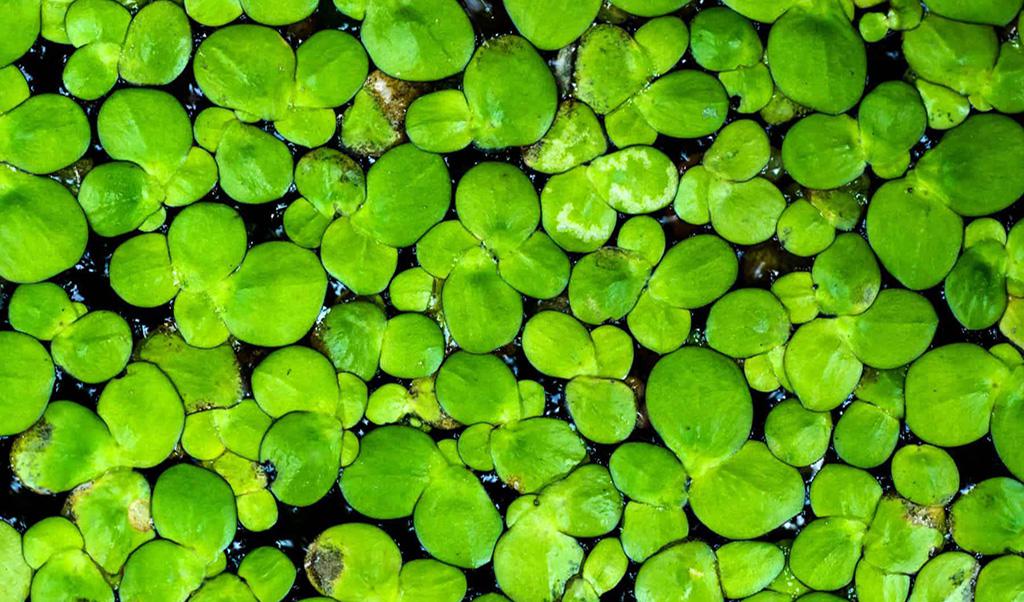
What Is Duckweed Good for?
Although the duckweed is potentially invasive, planting it in your aquariums is also salutary.
Improve water quality & keep the water clean
Duckweed plays a role in removing pollutants and wastes from the water. Fish, dead leaves plants, and other creatures in your tank can produce nitrates. However, the nitrites and nitrates even toxins in aquariums, which are harmful to fish, are food sources for duckweed. Hence, it prevents the accumulation of toxic chemicals and improves water quality. Aside from that, the duckweed also consumes the carbon dioxide in the water. In summary, the duckweed keeps the ammonia, nitrites, and nitrates at a low level in tanks.
Improve the oxygen level in the aquarium
Duckweed can circulate the air and produce oxygen in the aquarium. Then the oxygen level in aquariums improved. Nonetheless, dead duckweed will consume oxygen to decompose. As a result, it is necessary to pay attention to dead ones. Once you find them, you should remove them from the water, or they will decrease the oxygen level.
Avoid the outgrowth of algae
Duckweed can cover the water surface, consequently, the light in tanks will decrease accordingly. Nevertheless, the algae rely on light, as a result, the duckweed prevents the blooming of algae. Moreover, the duckweed also absorbs the nutrients from the water, which are necessary for algae. Ultimately, the algae may suffer death.
Provide food source for fish
Duckweed is sometimes a food source for fish, such as goldfish, Koi fish, and grass carp. Take goldfish as an example, they will eat the roots and leaves of duckweed. In addition, duckweed possesses low fiber and high protein, which is similar to meat.
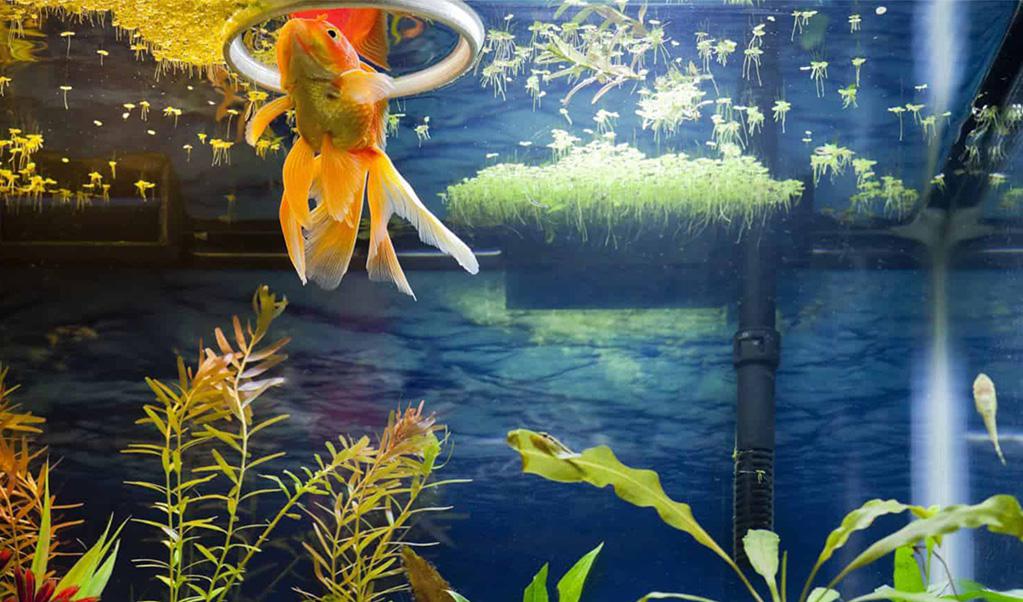
A natural habitat for fish
Duckweed cover with green color is similar to the wildlife habitat and makes your aquarium more natural. It will comfort your fish and is beneficial for their growth.
Provide shades and protections for fish
Duckweed not only reduces the evaporation rate of water but also provides shade to relax your fish. With comfortable hiding and resting places, there is less stress for fish. On the other hand, as the duckweed covers the surface of the water, the fish can not jump out of your tank, cichlids for example.
Duckweed Control Ideas
With a suitable population, the duckweed is beneficial for your tank. If outgrown, it will be a threat to aquariums, including accumulation of dead algae in your tank, and accelerating the growth of anaerobic bacteria. As a direct consequence, it will badly affect the water quality. Thus, it is critically crucial to control duckweed in aquariums. So, how?
Remove by hands or tools
You can remove the duckweed manually with your hands or some tools, for example, a fish net or a gravel rake. The method is effective but needs to be removed regularly and consistently, or the duckweed will occupy your tank quickly.
Introduce herbivorous fish
Some herbivores eat duckweed in tanks, such as goldfish, Koi fish, and Tilapia fish. However, you should introduce this kind of fish to your tanks before the dense outgrowth of duckweed. Because the duckweed can reproduce faster than the fish consume.
Apply an aeration device
Duckweed grows better in quiet and slow-moving waters. Thus, applying an aeration device can manipulate the growth of duckweed, like a fountain and air stone. On the other hand, it can also improve the oxygen level in your aquarium.
Limit the light
Duckweed requires photosynthesis. If you limit the light entering the tank, the photosynthesis will be inhibited, and then the duckweed will not grow as fast as when there is plenty of aquarium light.
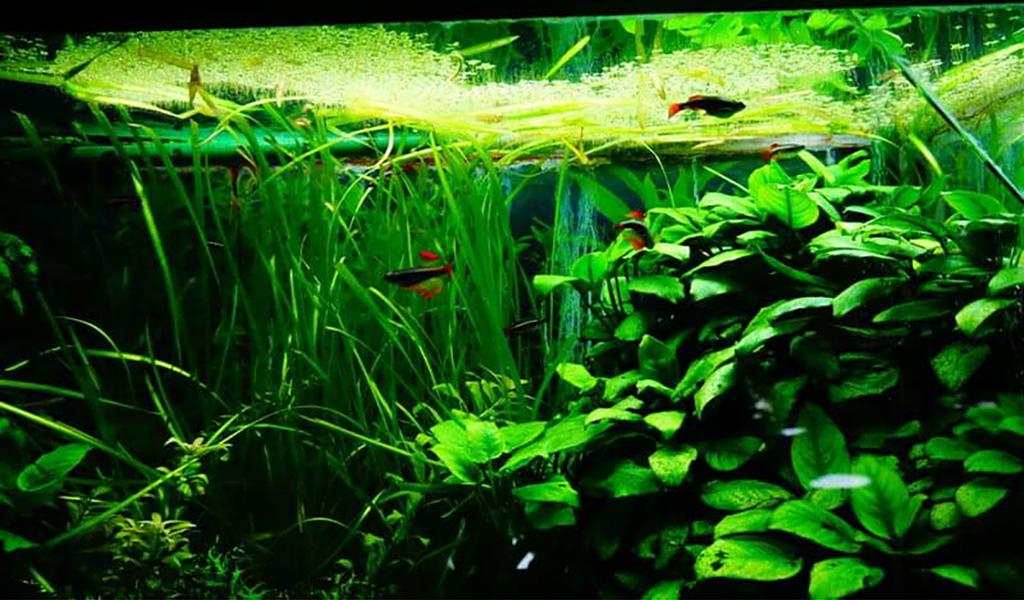
Use chemicals
It is recommended to use chemicals only when other methods are ineffective. The chemicals, also called herbicides, include fluridone and diquat bromide. While these chemicals will kill the duckweed, more importantly, these chemicals may also kill other plants in your aquarium and even harm your cute fish. Therefore, if you plan to use these chemicals, you should strictly obey the instructions on the package and be cautious.
Reminder
Aside from that, there are some tips for keeping duckweed in aquariums. First, place the aquarium in a warm and sunny location. Besides, it is better to keep the duckweed on the surface of still water, or they will not grow well. And it is feasible to add some minerals to the tank, as the minerals benefit the growth of duckweed. On the other hand, if the duckweed is thriving, you can move it to another tank with a fish net.
By the way, there are many ideal tank mates for duckweed, such as labyrinth fish, because they can adapt to any environment.
Finally, if you have other suggestions about duckweed, please leave a message below freely. Thanks for your reading!
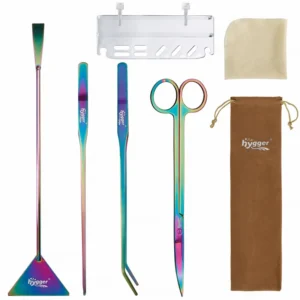
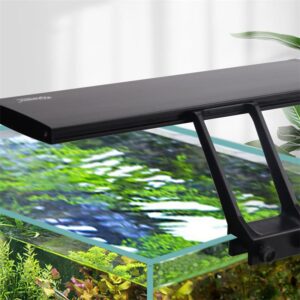
I have burnt round my dam and it’s killed a duck weed